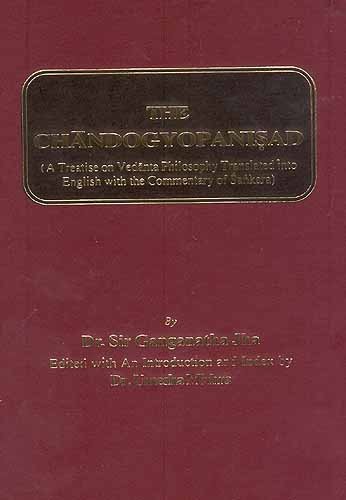Chandogya Upanishad (Shankara Bhashya)
by Ganganatha Jha | 1942 | 149,749 words | ISBN-10: 8170842840 | ISBN-13: 9788170842842
This is the English translation of the Chandogya Upanishad, an ancient philosophical text originally written in Sanksrit and dating to at least the 8th century BCE. Having eight chapters (adhyayas) and many sub-sections (khandas), this text is counted among the largest of it's kind. The Chandogya Upanishad, being connected to the Samaveda, represen...
Section 6.5 (fifth khaṇḍa) (four texts)
Upaniṣad text:
Food, eaten, is made threefold; its grossest matter becomes fæces; the middling part, flesh and the subtlest part, mind.—(1)
Commentary (Śaṅkara Bhāṣya):
Food, eaten is made threefold—i.e. when digested by the fire in the stomach, it becomes divided into three parts.—“In what way?”—When the food has become threefold, the grossest—coarsest—matter, the heaviest and most voluminous substance,—the coarsest part of the divided food—becomes faeces;—the middling matter of the food becomes modified into flesh, step by step, changing through the bodily fluids and other ingredients;—the subtlest—finest—matter goes up to the Heart and there enters the fine arteries called the ‘Hitā’ and the rest, and bringing into existence the aggregate of the organs of speech and the rest,—ultimately becomes the mind; that is, becoming modified into the form of mind, it goes on adding to the development of that Mind. Thus the Mind, being developed from food, is a material (elemental) substance, and it is not perceived to be something eternal, and impartible, as defined in the Vaisheṣika system. Though it is going to be asserted, later on, that ‘the mind is His Divine Eye’ (Chāndo. Upa. VIII. xii. 5.),—yet, that will not be in view of its eternality, it will be in view of its pervading over all objectives of all sense-organs,—even those that are subtle, hidden, remote and so forth. As regards its comparative Eternality in comparison to the other sense-organs,—that also is merely relative, as we shall explain later on; specially as the Vedic Text has declared that ‘Being is one alone, without a second.’—(1)
Upaniṣad text:
Water, drunk, is made threefold: its grossest matter becomes Urine; the middling matter becomes Blood, and the subtlest matter becomes the Life-breath (Prāṇa).—(2)
Commentary (Śaṅkara Bhāṣya):
Similarly, Water, drunk, is made threefold; of this, the grossest material becomes Urine; the middling matter Blood; and the subtlest matter becomes the LifeBreath; it is going to be declared that the ‘Life—Breath consisting of water, will never be cut off while the man is drinking it’ (Chāndo. Upa. VI. vii. 1.).—(2)
Upaniṣad text:
Fire, eaten, is made threefold; of that, the grossest matter becomes Bone; the midddling matter becomes Marrow, and the subtlest matter becomes Speech.—(3)
Commentary (Śaṅkara Bhāṣya):
Similarly, Fire, eaten,—in the form of oil, clarified-butter and the rest;—is made threefold; its grossest matter becomes Bone; its middling matter becomes Marrow,—the only matter inside the Bone;—the subtlest matter becomes Speech; by eating oil, clarified-butter and other such things, Speech becomes clear, distinct and eloquent,—as is well-known among people.—(3).
Upaniṣad text:
Thus, my dear, Mind is made up of Food; Life-breath is made up Water; and Speech is made up of Fire.—‘Explain to me again, Revered Sir,’ ‘So be it, my child’ he said.—(4)
Commentary (Śaṅkara Bhāṣya):
Because it is as described above, therefore, my dear. Mind is [made up of Food, Life-breath is made up of Water and Speech is made up of Fire.
Objection:—“Animals living on food (grains) alone, such as, the rat and the like, are possessed of Speech and of Life-breath (without taking water or oils); similarly, animals living on water alone,—such as the fish, allegator and other animals living in the Ocean,—are possessed of Mind and are endowed with Speech; similarly, it may be inferred that animals not taking any oils at all have Lifebreath and Mind. If all this is so, then how can it be said that Mind is made up of food?”
Answer:—This does not affect our position. All things being triplicate in their constitution, everything is possible everywhere. As a matter of fact, no one eats food that is not triplicate in its constitution; nor does any one drink Water that is not triplicate, nor does any one eat Fire that is not triplicate in its constitution. So that for those who eat Food,—such as, rats and the like,—there is nothing incongruous in their being endowed with Speech and Life-breath.
Being thus somewhat convinced, Śvetaketu said—‘Revered Sir, explain to me again,—how Mind is made up of Food etc., etc., by means of illustrations; as not yet am I very sure of all this’.—What was in Śvetaketu’s mind was this—‘It is hard to understand how, in the single body,—which consists equally of Fire, Water and
Food,—when Food, Water and Oils are used, they develop Mind, Life-breath and Speech (respectively), as their subtlest constituents,—without transgressing beyond their own essential nature’; hence he said ‘Explain again, Sir.’
When the son had said this, the Father said—‘Be it so, my Boy; listen to the illustrative examples how all this is possible,—as you ask.’—(4)
End of Section (5) of Discourse VI.
